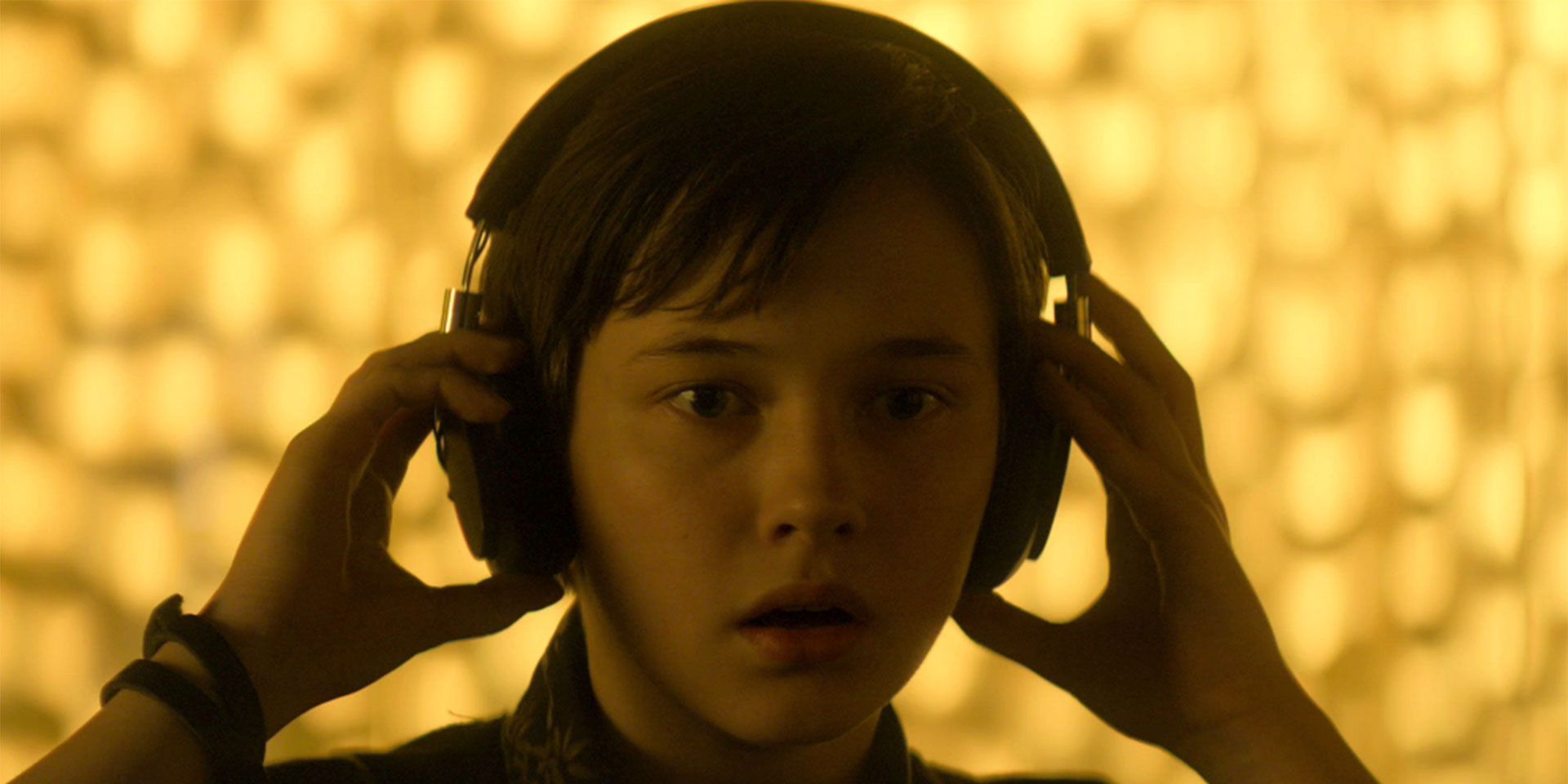
Episode 7 of Hulu's Devs featured some shocking revelations and devastating twists as the miniseries moves closer to its endgame, but arguably the most upsetting event was the death of Lyndon (Cailee Spaeny), the ex-sound engineer for the Devs team. The science-fiction/cyberpunk series, written and directed by Alex Garland, follows a young woman named Lily Chan (Sonoya Mizuno) investigating the tech company, Amaya, which she believes is responsible for the death of her boyfriend. However, as both Lily and viewers have discovered, there's much more than murder going on inside the walls of Amaya, as the company's eccentric CEO, Forest (Nick Offerman), is desperate to perfect a quantum computer capable of projecting the past and predicting the future.
Lyndon, a bright, young technological prodigy previously employed by Devs, has had a rather rocky turn over the past few episodes. Back in episode 4, he took the first step to perfecting the Devs computer by swapping out Forest's deterministic quantum theory of the universe with Hugh Everett's many-worlds theory, which posits that all outcomes of all events are possible in an infinite number of universes. Despite the switch clearing up the Devs projections, Forest, ever the fundamentalist, fires Lyndon for perpetuating what he believes to be a cheat code, ignoring the fact that his De Brogile-Bohm theory was the thing holding the Devs program back in the first place. Nevertheless, his dismissal from Devs destroys Lyndon and leads him on a path of self-destruction in an attempt to get back into the program.
This culminates in a desperate meeting with Katie (Alison Pill), who is Forest's right-hand woman and lover, at a bridge overlooking a dam. Katie and Lyndon always shared an unspoken respect, and Lyndon hopes that this respect will be enough for Katie to allow him back into Devs. But Katie has already seen the outcome of this conversation, and she knows that it doesn't end with a reinstatement, but instead Lyndon's death. Lyndon is prompted to risk his life in order to prove his dedication to the many-worlds theory, and while he does unfortunately die in the primary universe Devs takes place in, his death has major implications for the show's philosophy and the many-worlds theory.

Aside from being the missing component necessary to fundamentally perfect the Devs computer, Lyndon's many-worlds theory also provides a compelling counter-argument to Forest's entire outlook on life. Forest believes in determinism, a theoretical interpretation of the universe that states everything that has ever happened in history has been the result of basic cause and effect. The idea of free will is simply an illusion, and every action taken from the beginning of the universe to the end of it is predetermined. This is why Forest (and Katie) are content with the atrocities that happen as a direct result of their research at Devs: these events were always going to happen so it would be futile to stop them. But at the heart, Forest clings to this theory because it provides him the comfort of believing that he wasn't responsible for the death of his wife and child, who were killed in a car accident while talking to him on the phone. Any other interpretation of the universe results in his actions being his own.
Lyndon's interpretation is one of personal accountability, which is why he never used the Devs program to look into his own future. This is also why his experiment makes perfect sense. Lyndon decides (with a little help from Katie) that the best way to test his faith in the many-worlds theory is to balance on the precipice of the bridge overlooking the dam; if the Everett theory is true, then there are countless universes in which Lyndon dies on impact, but there are also countless universes in which he survives and regains his job at Devs. His faith in the many-worlds theory is so immense that he's willing to risk his life, and whether or not that risk is paid off isn't entirely certain.

There are many different implications that spring from an acceptance of the many-worlds theory, but one of the most puzzling is the idea of quantum immortality. Katie hints at this after she tells Lyndon about his experiment. Quantum immortality is an extension of a thought experiment named quantum suicide, designed by theorist Hans Moravec and further developed by additional scientists and researchers. The experiment is a variation of the Schrodinger's Cat experiment, with the major difference being that the "cat" or participant is the one recording the results. This is due to the belief that only someone whose life or death is totally randomized can distinguish between different quantum theories.
Unlike Schrodinger's Cat, which exists in one state: alive or dead, the idea of quantum suicide in the Everett model suggests that in the event of a 50/50 chance of death, there are two variations that will occur: one in which you live and one in which you die. If you live, the experiment can be repeated again, and again, and again ad nauseam, with dozens of alternate universes arising in which you die. The idea of quantum immortality states that, since consciousness is extinguished upon the point of death, you will never remember any of the universes in which you die. Instead, your consciousness will follow the progression of universes in which you live, effectively rendering you immortal.
This is heavily implied by the circumstances of Lyndon's death. Since the experiment is balance on the precipice of a bridge, there's a roughly 50/50 chance in which Lyndon lives or dies. The universe the episode follows results in Lyndon's death, and so do dozens of other universes, potentially an infinite number. However, by the logic of the many-worlds theory, there are also an infinite number of universes in which Lyndon lives and regains his job at Devs. Based on the idea of quantum immortality, Lyndon's consciousness may be alive in one of those universes, blissfully unaware of his fate in this one.

Hopping out of the many-worlds theory and back into Forest's determinist one, episode 7 raises a serious ethical question regarding Katie's role in Lyndon's death. In the episode, Lyndon and Katie start out with a simple discussion about the possibility of Lyndon returning to Devs. However, Katie pivots, instead revealing that she's seen the outcome of the conversation already, and it ends with Lyndon standing on the precipice of the bridge in an effort to prove the many-worlds theory. Lyndon, of course, jumps on the opportunity to regain his job, but not before asking Katie if he would have done the experiment had she not already told him he was going to. She refuses to answer and also refuses to tell him if she's seen him dying.
In the wider context of the show, this isn't as direct as Forest facilitating Sergei's murder through Kenton (Zach Grenier) in episode 1, but it still raises the same questions regarding Forest's determinist philosophy. If everything is based on cause and effect, then is Katie truly responsible for putting the idea in Lyndon's head, knowing full well that he would go through with it? Well, by that logic, no, but it also remains to be seen whether or not the universe audiences are following is truly deterministic. From an outside perspective, it seems as if Forest and Katie have been facilitating events from the very first episode towards a specific outcome. With episode 8 expected to resolve the storyline, Devs may throw a wrench at its viewers at the last moment, holding its characters responsible for everything they've done so far.
from ScreenRant - Feed https://ift.tt/3a2sj9d



0 Comments